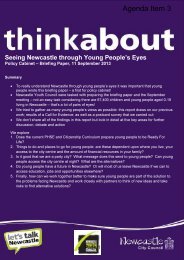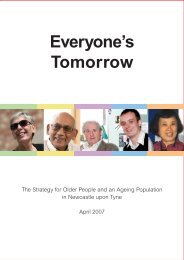NEWCASTLE'S MUSICAL HERITAGE AN INTRODUCTION By ...
NEWCASTLE'S MUSICAL HERITAGE AN INTRODUCTION By ...
NEWCASTLE'S MUSICAL HERITAGE AN INTRODUCTION By ...
You also want an ePaper? Increase the reach of your titles
YUMPU automatically turns print PDFs into web optimized ePapers that Google loves.
given in Newcastle. They were held in the Assembly Room in the Groat Market,<br />
commencing soon after Michaelmas, 1736 and continuing through the winter.<br />
The following year there was a concert in the Race Week, another on the<br />
Wednesday in the Assize Week (the latter for Mr Avison’s benefit), and the<br />
subscription concerts were repeated. In 1738, he had again a benefit concert in<br />
the Assize Week and took upon himself the sole liability of the subscription<br />
concerts, changing the hour of commencement from 9 P.M. to 6 P.M. and<br />
charging 2s 6p for a ticket, which admitted one gentleman or two ladies to the<br />
whole series. Next year the concerts were renewed with increased success. On<br />
29 th November, as we learn from a local record, “there was a grand performance<br />
of three celebrated pieces of vocal and instrumental music – viz., ‘To Arms’ and<br />
‘Britons, Strike Home’, the ‘Oratorio of Saul’ and the ‘Masque of Acis’. There<br />
were twenty-six instrumental performers, and the proper number of voices from<br />
Durham. The gentlemen and ladies joined in the chorus, and all present saluted<br />
the performers with loud peals of claps, acknowledging a general satisfaction.<br />
There was the greatest audience that ever was known on a like occasion in<br />
Newcastle.’<br />
These concerts continued under the management of Charles Avison until his<br />
death, and afterwards by his sons.<br />
We have little idea of what sort of person the young Avison was and I am not<br />
the first person to be at a total loss to understand why he chose to give up the<br />
opportunity of a career at the centre of music in the capital and instead become a<br />
humble parish church organist in Newcastle. The portrait of him in the Laing Art<br />
Gallery – painted when he was 41 provides food for thought. The high domed<br />
forehead and large sensitive eyes point to a man of reflective, caring and sincere<br />
disposition. The receding hairline and the set of the features give the impression<br />
of intelligence, quiet determination with perhaps just a hint of artistic arrogance. It<br />
was said that Avison had the basic characteristics of a north countryman;<br />
shrewdness, common sense and outspokenness tempered by a refreshing sense<br />
of humour. Georgian London, quite obviously, did not appeal to him. Perhaps his<br />
small town upbringing, his limited education and his north country dialect left him<br />
feeling like a fish out of water in the artificial, insincere, hot house atmosphere<br />
that, as a musician, he would certainly have had to involve himself in if he wanted<br />
to progress in the capital, (The great George Stephenson suffered a similar fate<br />
a century later and was asked by one member of the Parliamentary Committee<br />
he was addressing, “Are you a foreigner”) Did Avison perhaps foresee the<br />
advantages of accepting the appointment as organist at St Johns’ as a golden<br />
opportunity for him to indulge his career as a musician in a ‘plum’ post without<br />
the struggles, the competition and attendant hardships of having to establish<br />
himself in London or some unfamiliar provincial town Or was it, as I prefer to<br />
think, that strongest of all reasons that brought him back; the love of a woman.<br />
The woman he married soon after his return and lived happily with for the<br />
remainder of his life. His contemporaries considered him to be a man of energy<br />
and enthusiasm and a person of considerable charm and general culture. Avison<br />
11

















